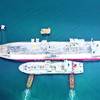Several key actions were taken by the American Association of Port Authorities’ (AAPA) Legislative Policy Council (LPC) at its 92nd annual convention being held this week in Curaçao, Netherlands Antilles. The LPC is comprised of port directors representing each region of AAPA’s U.S. Delegation.
Port security continues to be one of the highest priorities for AAPA. Actions taken in this area relate to Federal funding and limited liability. Highlights include the following.
· A call for $400 million in Federal funding for the Transportation Security Administrations (TSA) port security grant program in the FY ’05 Federal budget. The FY’04 level is expected only to be $125 million, while the Coast Guard projects the cost to be $1.125 billion in the first year.
· A first-time AAPA endorsement was passed for Federal funding for Operation Safe Commerce, a TSA grant program that tracks port cargo from its place of origin to its final destination to ensure containers remain secure and tamper-free throughout the entire supply chain. The program has been tested for the last year at three load centers including the ports of Seattle/Tacoma, New York New Jersey and Los Angeles/ Long Beach. The program will be expanded next year to other ports.
· AAPA will also join with others in the maritime industry to urge Congress to limit the legal liability of those who are in compliance with the Maritime Transportation Security Act.
In other action, the Committee voted to join other major transportation and maritime organizations in opposition to the Intermodal Equipment Safety and Responsibility Act of 2003 (H.R. 2865), which would dramatically change the current regulatory regime governing liability for chassis roadability. Under the proposed legislation, “equipment controllers” would be liable for all violations of the Federal Motor Carrier Safety Regulations attributable to the controller’s equipment except for those caused by the negligence or willful misconduct of the motor carrier, which could impose significant new liabilities on terminal operators. AAPA filed comments with the Federal Highway Administration in 1999 opposing new regulations on chassis roadability and with the Federal Motor Carrier Safety Administration in 2003 supporting a private sector solution to roadability issues versus a Federal negotiated rulemaking.
Subscribe for
Maritime Reporter E-News
Maritime Reporter E-News is the maritime industry's largest circulation and most authoritative ENews Service, delivered to your Email five times per week










